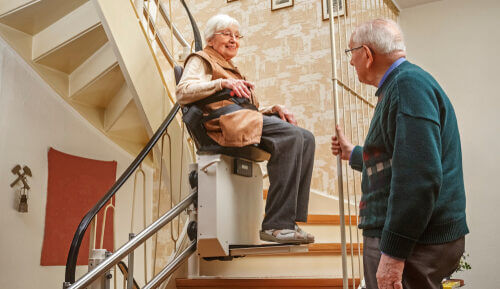
Home is an important place for all of us. It provides a haven from the outside world and is somewhere we should feel safe and comfortable.
Your home may be even more significant if you’re an older person or living with a disability, whether that’s because you’re receiving care at home or are spending less time out and about. But what happens when your home is no longer meeting your needs?
Home adaptations are changes that are made to your home to ensure your space is suitable for you. They can be minor updates or larger, structural changes, and they make it possible for people to continue living in their homes safely and independently.
Home adaptations can be costly, but there is support available to help cover the cost. We’ve explored what support is available to help with funding home adaptations in Wales.
The first step in attaining any home adaptations is to find out what your local council can do for you. To do this, you may need to arrange an assessment of your home or of your individual needs.
Home assessments
You can apply for home adaptations through your local council. After you apply, they’ll arrange an assessment of your home where a professional, usually an Occupational Therapist, will visit your home to take a look and work with you to decide on changes that would improve your life.
You can apply for a home assessment through the government website here. It is free of charge.
The person carrying out your home assessment may put you forward for a care needs assessment if they think you would benefit from further support.
Care needs assessments
A care needs assessment is like an extension of a home assessment, as well as looking at your living situation, it will also consider additional ways you might benefit from support, such as visits from a paid carer, for example.
Like a home assessment, needs assessments are free of charge and will involve an Occupational Therapist (or another appropriate healthcare professional) visiting you and finding out more about the things you’re finding difficult in your day-to-day life.
You can find out more about care needs assessments in our article here.
Funding home adaptations in Wales
There are a number of schemes available in Wales for older or disabled people who need support paying for home adaptations.
ENABLE: support for living independently
If you live in Wales and you or someone you live with has a disability or is an older person, The Support for Independent Living Scheme offers a grant to help fund the cost of adaptations to your home.
The Independent Living Scheme includes three broad categories:
- Small – small adaptations will not require a means test or the involvement of an occupational therapist. There will be a short delivery time target, and each adaptation is expected to cost no more than £1000. Small adaptations include things like grab rails and stair rails.
- Medium – medium adaptations include things such as walk-in showers, stair lifts and ramps. An occupational therapist will usually be asked to be involved, and some adaptations in this category will require a means test. Medium adaptations are expected to cost between £1,001 and £10,000.
- Large – large category adaptations usually require major structural changes to a property and/or extensions to it. An assessment by an occupational therapist will need to take place and all major adaptations will be means tested. Large adaptions cover anything which costs over £10,000.
The scheme is open to people who own their own homes as well as those who privately rent or rent from the council or housing association. If you rent, you’ll need to contact your landlord.
Disabled Facilities Grant
The Disabled Facilities Grant, available in England and Northern Ireland as well as Wales, offers financial support to people who are older and/or living with a disability to help fund home adaptations.
The grant is means tested, meaning that factors such as your income and any savings you have will be assessed to determine the amount of grant you’re eligible for. However, this only applies to home adaptations that cost more than £8000.
The current maximum amount of DFG in Wales is £36,000. Depending on your situation, you may be eligible for support through both the Disabled Facilities Grant and The Support for Independent Living Scheme.
The best way to apply for a Disabled Facilities Grant will depend on your living situation:
- If you own your own home – apply for a needs assessment through your local council. From here, your council will determine what adaptations would suit you and how much they’re willing to pay towards this.
- If you are renting privately – ensure you seek permission from your landlord. They may be able to apply for a DFG on your behalf.
- If you live in council housing or rent from a housing association – contact your landlord to find out how they manage adaptations. Some housing associations will provide their own funding for adaptations and in some cases if the council/housing association cannot fund adaptations, they may find you an alternative home which is more suitable for you.
You can apply for a Disabled Facilities Grant on the government website here.
Care & Repair services
Operating across Wales, Care & Repair is a charity specialising in home adaptations for older people. Supporting over half a million people each year, Care & Repair can help with repairs, maintenance, and adaptations to help people to live safely and independently in their own homes.
To be eligible for support through Care & Repair, you need to:
- Be living in Wales – you can live in any Welsh county in any area.
- Be over 60 years old.
- Own your own home or be renting privately. In some areas of Wales, Care & Repair can offer support to people living in social housing.
As well as offering support with home adaptations, Care & Repair Agencies can also help with:
- Home assessments
- Home repairs
- Home safety and efficiency
- Disability support
- Reablement from hospital to home
- Support with benefits
- Signposting to relevant services
Home assessments and advice about adaptations are free of charge through Care & Repair. Although the charity doesn’t provide direct funding for home adaptations themselves, they will work with you to help obtain financial support to fund the work needed. To find out more about the services offered and if you are eligible, you can reach out to your local Care & Repair Agency on the website here.


